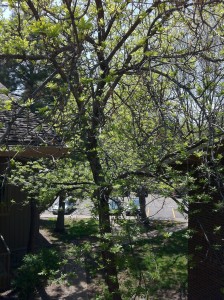http://cnn.com/video/?/video/us/2011/07/19/vo.nasa.atlantis.undock.nasa
(can’t get CNN video to embed with window, sorry)
{ 0 comments }
http://cnn.com/video/?/video/us/2011/07/19/vo.nasa.atlantis.undock.nasa
(can’t get CNN video to embed with window, sorry)
{ 0 comments }
If you don’t know about Elevatorgate this won’t be as funny, but I think he got it right.
{ 0 comments }
This article reminds me of my father and grandfather, and their never ending collecting of fasteners and other hardware do-dads. Sadly, my box of fasteners was not packed in the move, so I have had to start from scratch. But I’ve got a cool new box to put them in.
{ 0 comments }
 Well, Spring has definitely sprung here on the edge of the plains. It’s a different transition than the one I grew up with. It starts small, but it grows exponentially once it’s underway.
Well, Spring has definitely sprung here on the edge of the plains. It’s a different transition than the one I grew up with. It starts small, but it grows exponentially once it’s underway.
And one of the reasons it’s so easy to see Spring is how brown everything is in winter. I would guess that in San Diego many of the plants don’t lose their leaves in Winter, so the general landscape continues to have some green. But here, 75% or more of the plants are nothing but brown sticks in winter. Except for the Junipers and pine trees, which in late winter are a sickly sort of olive green/brown color, everything is bare. But within a month of the first buds appearing, the plant life has gone crazy. Everything is blooming and leafing out with abandon.
I always said that the seasons in San Diego were for people who appreciated subtlety, and Spring was no exception. Although the local grasses responded to the rain quite quickly, most of spring didn’t leap to life like it seems to here. Spring here seems to arrive like an earthquake, not much warning beforehand, but them ‘Bam’ there it is.
Spring also seems to be wetter than I’m used to. Had two gray rainy days here this week; that would be very unusual in San Diego. But less morning marine layer here in Boulder.
{ 1 comment }
It just so happens that I read two of the books that just won Pulitzer Prizes.
For General Nonfiction – “The Emperor of All Maladies: A Biography of Cancer” by Siddhartha Mukherjee. This book does a wonderful job of explaining what cancer is and why it is so difficult to fight medically. It gives a complete history of how humans have experienced cancer and where the few successes against cancer have come from, as well as some of our major failures. And though much of the history of fighting cancer is not a happy story, the author does a good job of leaving the reader with a sense of hope for the future. A realistic hope, but a solid one. Though the book has a fair amount of science to read through, the author does a nice job of making things understandable for the lay reader. His win is well deserved. (This was the first book I bought for my Kindle.)
For History -“The Fiery Trial: Abraham Lincoln and American Slavery” by Eric Foner. Foner’s book takes you through the mind and policies of Abraham Lincoln and his position on slavery (as best it can). Using a wide variety of sources Foner shows how Lincoln’s ideas about the slavery issue changed over his life. It paints the picture of a man who transitions from being personally uncomfortable with slavery, but living where the issue was of little concern for him to the man at the center of the Emancipation Proclamation and the Civil War. Seeing the transition of Lincoln’s ideas over his life gives me even greater respect for him – as he learned and grew, his positions and policies had to change (particularly with respect to believing that former slaves would want/need to return to Africa). Foner’s writing is clear and straightforward, though the subject material is sometimes difficult to get through. A book that will stay with me as we enter the 150 Anniversary of the Civil War.
Didn’t Win Anything -“The Disappearing Spoon: And Other True Tales of Madness, Love, and the History of the World from the Periodic Table of the Elements” by Sam Kean. I asked for this book at Christmas and it was a great choice. Kean lays out the Periodic Table and its elements in a way that makes such sense. I’m sure I’ve retained more Chemistry from this book that I took from classes in high school and college just because of the way Kean explained things. And the stories about the discovery of the various elements is fascinating. Some are just like ‘duh’ moments, but others read like spy novels or action movies. Not for everyone I’m sure, but I loved it.
{ 1 comment }
Since I don’t have the time to catch up with 47 years of episodes by Saturday, I chose this instead.
Everybody got that?
{ 0 comments }
(Language is NSFW)
{ 1 comment }
For those of you who don’t have an encyclopedic memory of Diana’s many looks, go here.

{ 0 comments }
A timeline of the events in the Middle East by the Guardian. Very interesting.
{ 0 comments }